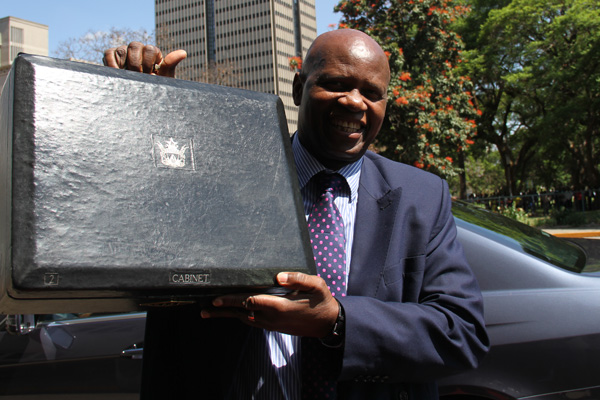
Finance minister Patrick Chinamasa last Thursday presented the 2016 National Budget where he indicated he had set aside $4 billion for the coming year.
It would, however, appear that next year’s budget is somehow more or less the same as the previous three or so years.
For the year 2013, former Finance minister Tendai Biti presented a $3,8 billion budget before his successor Chinamasa chipped in with a $4,2 billion budget in 2014 and a $4,1 billion budget for 2015 which was, however, later revised downwards to $3,9 billion.

The above figures suggest that Zimbabwe’s economy is not going anywhere — but static. We believe the economy should grow through local and foreign direct investment. Yet the figures show this hasn’t been the case for the country although the authorities would want us to believe that the economy is on a rebound.
Clearly, the panacea to the economy lies in revamping moribund self-serving indigenisation and investment policies that have for long been cited by potential foreign investors as the major scare.
Under these policies, government has been found wanting, indicating left and turning right in most cases.
The Essar Africa Holdings deal to revive Ziscosteel is one such example. For long the nation was told everything was in order, but Chinamasa last week admitted that the deal had collapsed, and that over 3 000 Ziscosteel employees would be laid off as a result.
- Chamisa under fire over US$120K donation
- Mavhunga puts DeMbare into Chibuku quarterfinals
- Pension funds bet on Cabora Bassa oilfields
- Councils defy govt fire tender directive
Keep Reading
Netherlands-based VimpelCom was also forced to sell its 60% stake in Telecel Zimbabwe after intense friction with hawks in government who wanted to grab the investment for a song.
If this is not another indicator of the “unfavourable” government policies forcing flight of investment by foreign firms, we do not know what else is. One wonders why a country crying for investment would fail to respect property rights by targeting foreign firms simply for selfish gains at the expense of the whole country.
The signs are clear that the economy can only rise from the ashes with foreign direct investment. Is it not ironic that in other countries, $4 billion would be an allocation for a particular portfolio rather than the whole country, while in others Zimbabwe’s budget could be for a single company? It is now time for President Robert Mugabe and his Zanu PF party to swallow their pride and accept that Zimbabwe comes first before personal interests and do away with policies that threaten foreign capital.
Zimbabwe needs a new thinking — not the “we-went-to-war” mantra preached by Mugabe and his top Zanu PF officials at any given opportunity.
If the investment conditions become favourable, other organisations could come in handy and opt to fund sectors of their preferred interests, thereby reducing the strain on government’s proposed allocations.
Investors are interested in infrastructure development in the country under the build-operate-transfer facility, but conditions are not favourable at the moment.
Zimbabwe cannot continue to have a static budget. The country’s leaders must accept that the electorate needs a new paradigm shift and look forward to economic prosperity to achieve their aspirations.











